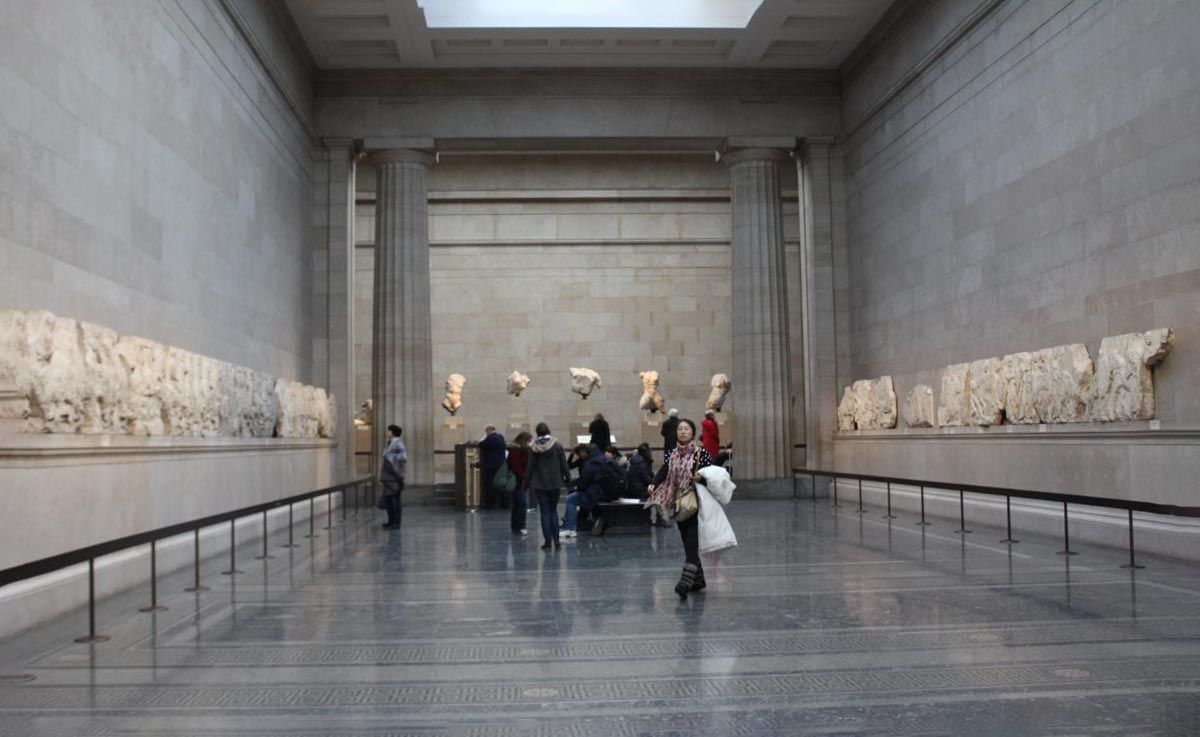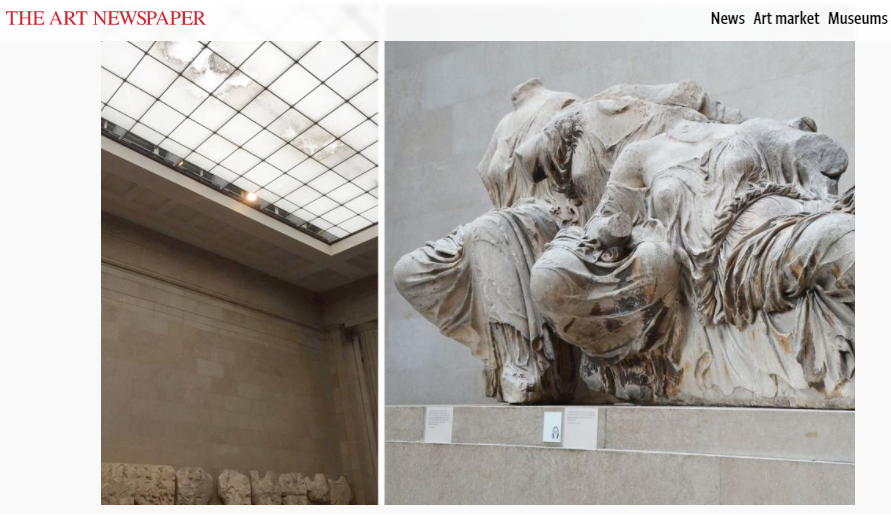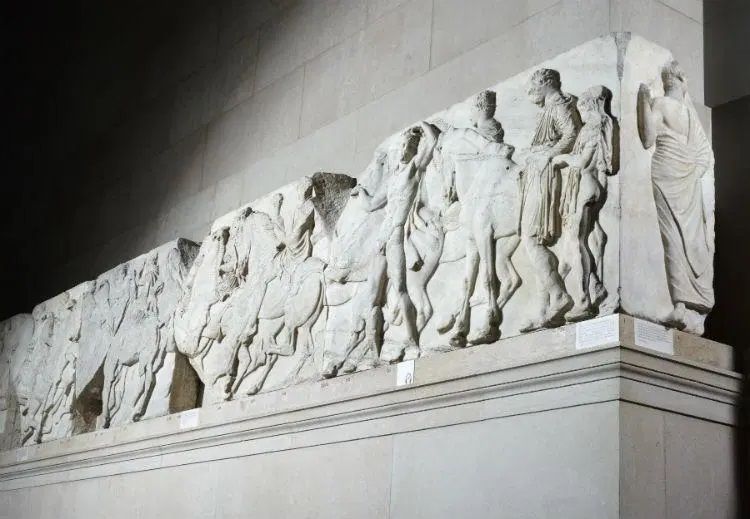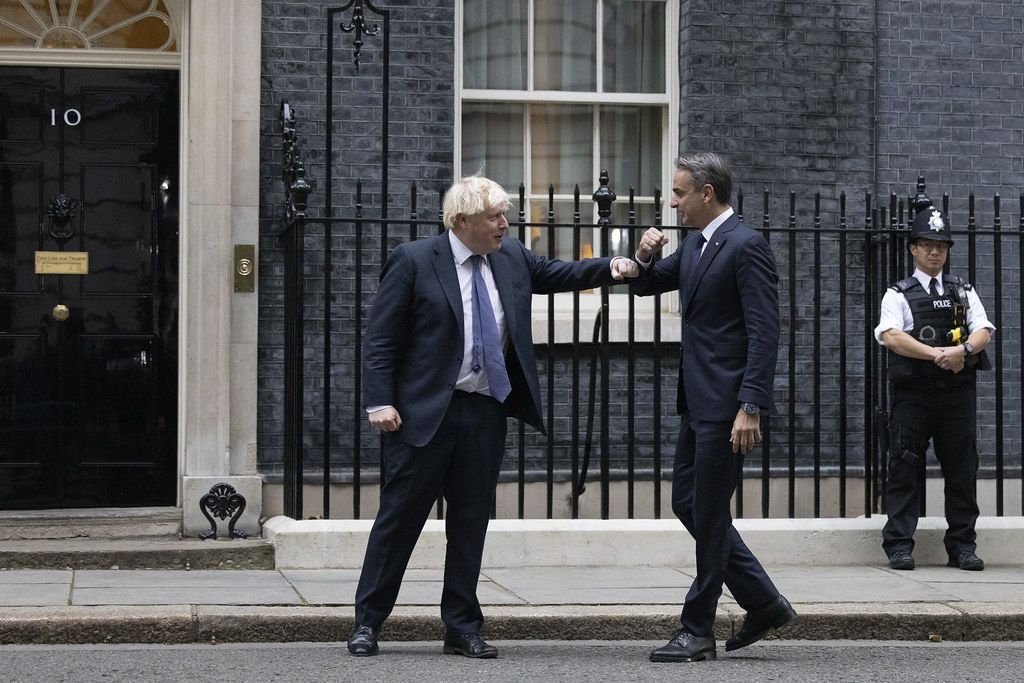Return of Parthenon Marbles to Greece Up to the British Museum Says Downing St

The Parthenon Marbles at the British Museum .Photo source: The British Committee for the Reunification of the Parthenon Marbles
In a slight shift of approach, Downing Street said this week that the decision to return the Parthenon Marbles to Greece was up to the British Museum and not the government.
The statement was made prior to a visit to London by Greek Prime Minister Kyriakos Mitsotakis this week.
The Greek PM met on Tuesday with his UK counterpart Boris Johnson at Downing Street, where he reiterated Greece’s call for the return of the 2,500-yer-old sculptures offering as a sign of good will to exchange other Greek treasures and museum items with the British Museum that have never before exited Greece.
Return of Parthenon Marbles a ‘Fair Request’

Greek Prime Minister Kyriakos Mitsotakis with UK PM Boris Johnson on Downing Street. Photo source: @PrimeMinisterGR
“It’s a fair request,” said Mitsotakis adding that the “time has come”.
“We will persist methodically to build the necessary foundations for the British public opinion on the need to reunite these with the sculptures on show at the Acropolis Museum. It is an important issue that concerns bilateral relations,” the Greek PM told journalists after the meeting.
Mitsotakis stressed that though the return of the Marbles, which were illegally removed by Lord Elgin from the UNESCO World Heritage Site in Athens in the 1800s and sold to the museum, is still a priority, Greece would continue to work towards strengthening bilateral ties through trade, education and tourism.
UK Government Change of Stance
Despite claiming to be a self-professed fan of Ancient Greek studies, Johnson refused to return the Marbles in the same discussion earlier this year.
This time around, the British PM said he “understood the strength of feeling of the Greek people on this issue”, but reiterated the UK’s longstanding position that this matter is one for the trustees of the British Museum, changing his previous position.
The Guardian reports that there is an “apparent change to the previous UK position” and cited Johnson’s spokesperson who said on Tuesday that “the possession of the Marbles is a matter purely for the museum. It’s not one for the UK government”.
Public Still Can’t See Parthenon Marbles
In the meantime, in August, the British Museum, which had claimed in the past that Greece had no place to host, preserve, care and exhibit the Greek art works “safely”, was slammed for the terrible conditions of its “Greek” galleries with media publishing photos depicting a leaking roof and water seeping into seven galleries featuring items including the Parthenon Sculptures.

Left: The stained roof in the Parthenon sculptures gallery in January 2020. Right: Figures from the pediment of the ancient temple in the British Museum © The Art Newspaper
At the time, a spokesperson from the museum confirmed that “there was some water ingress in one of the [Greek] galleries” but could not identify which gallery.
The display is still closed to the public.

Marble relief (Block XLVII) from the North frieze of the Parthenon. Athens, 438–432 BC., Photo source: British Museum
It should be reminded that the United Nations General Assembly – with the support of 74 countries – has supported Greece’s request, accepting its proposal for the return of cultural property unlawfully removed as part of ongoing efforts to protect the world’s cultural heritage.
US congress has also called for the return of the Parthenon Marbles and UNESCO has called for a “mutually acceptable solution” recognizing the historical, cultural, legal and ethical dimensions of the issue.
Speaking to The Guardian, Paul Cartledge, emeritus professor of Greek culture at Cambridge University and vice-chair of the British Committee for the Return of the Parthenon Marbles, said the change of approach this week was “a sleight of hand”.
“It’s a nonsense,” he said. “Even if the trustees agreed to relinquish them, the final decision to rescind the act of 1816 which declared the Elgin Collection to be owned by the nation would legally have to go through the British parliament. There is no doubt that the pressure is building up for genuine, post-imperial reconciliation in the cultural sphere and Johnson is trying to evade it.”








I am not ok with a country that says they are “civilized” when they don’t want to give back what they took (art pieces), without rights from another country. We passed the time of colonialism, but the one who colonize so many other countries around the world today forgets their proper “manners” and maybe their need to be re-educated in history.
Greece has much more art around the country, where people can see in open spaces and have a feel not just for the art but for their surrounds. Lets move on because They are not going to return it!
Pfffff…I can’t keep a straight face when I read about how art i s stolen and then the thieves refuse to return the pieces.